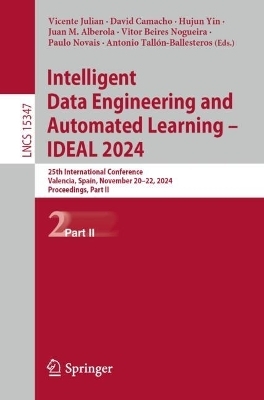
Intelligent Data Engineering and Automated Learning – IDEAL 2024
Springer International Publishing (Verlag)
978-3-031-77737-0 (ISBN)
This two-volume set, LNCS 15346 and LNCS 15347, constitutes the proceedings of the 25th International Conference on Intelligent Data Engineering and Automated Learning, IDEAL 2024, held in Valencia, Spain, during November 20-22, 2024.
The 86 full papers and 6 short papers presented in this book were carefully reviewed and selected from 130 submissions. IDEAL 2024 is focusing on Big Data Analytics and Privacy, Machine Learning & Deep Learning for Real-World Applications, Data Mining and Pattern Recognition, Information Retrieval and Management, Bio and Neuro-Informatics, and Hybrid Intelligent Systems and Agents.
.- A Divide-and-Conquer Approach for Container License Plate Detection Using Multi-Frame Analysis.
.- Smart Sign Language Decoder.
.- Hotel's Price Prediction Based on Country Specific Data.
.- New Approach to Support the Breast Cancer Diagnosis Process Using Frequent Pattern Growth and Stacking Based on Machine Learning Techniques.
.- An Ontology-Lexicon-Driven Approach for Refining Sentiment Analysis Processes.
.- Characterising Class Imbalance in Transportation Mode Detection: An Experimental Study.
.- LeakG3PD: a Python generator and simulated Water Distribution System dataset.
.- Providing Informative Feedback in a Low-Cost Rehabilitation System using Machine Learning.
.- Noise tolerance and robustness ranking in Machine Learning models.
.- A supervised clustering approach to detect similar soccer players.
.- Three-Part Genetic Algorithm to Optimize the Outbound Train Loading Process Using a Multiple Travelling Salesman Problem Approach.
.- Using Data Augmentation For Improving Text Summarization.
.- Special Session on Predictive and Prescriptive Models for Smart Cities' Applications.
.- Sustainable demand-responsive transportation: A case study in rural Guimarães.
.- CLARA: Semi-Automatic Retraining System.
.- A grid-based approach for ambulance dispatch in critical emergencies within static systems.
Optimizing vehicle coordination at multi-lane intersections using traffic control algorithms.
.- Optimizing Pedestrian Paths to Minimize Exposure to Urban Pollution Through Traffic Data Analysis.
.- Optimizing UCO Container Placement in Urb. Envs: A GA Approach.
.- Special Session on Computational intelligence on Renewable Energies and Sustainable Automation.
.- Data analysis and anomaly detection in a wind farm with k-Nearest Neighbors.
.- Development of a Database for Convolutional Neural Networks Simulating CFD Analysis.
.- Special Session on Example-based Explainable Artificial Intelligence.
Entity Examples for Explainable Query Target Type Identification with LLMs..
Near Hit and Near Miss Example Explanations for Model Revision in Binary Image Classification
.- Special Session on Explainability and Fairness in Decision Support.
.- Evaluative Customized Naïve Associative Classifier: promoting equity in AI for the selection and promotion of human resources.
Clustering of Serious Game Traces using Formal Concept Analysis.
LORE4GroupRS: Explaining group recommendations supported by a local rule-based approach.
.- Special Session on Federated Learning, Intelligent Fusion and Applications (FLIFA)
.- Comparing MAE and RMSE as fitness of Genetic Algorithm for optimizing Echo State Network hyperparameters with different probabilistic distributions.
.- Federated Learning with Discriminative Naive Bayes Classifier.
.- Advances in Home Care and Real-Time Vital Signs Monitoring.
.- Exploring Data Symbion EI deep learning and model sharing modules.
.- A New Dataset for Analyzing Battery Failures in Wheelchairs.
.- A Methodology for Automated Conversion of Axis-Aligned to Polygonal and Oriented Bounding Box Annotations in Aerial Imagery Object Detection.
.- Multi-Layered Asynchronous Consensus-based Federated Learning (MACoL).
.- .- Comparative study of Federated Learning algorithms based on SPADE agents.
.- Robotic Precision Fitness: Accurate Pose Training for Elderly Rehabilitation.
.- Special Session on Quantum Computing for Machine Learning and Optimization (Q4ML-Opt).
.- Hybrid Quantum Solvers in Production: how to succeed in the NISQ era?.
.- QUBO Optimization of Electrical Grid Topologies.
.-Special Session on Anomaly Detection with Machine Learning.
.- Indecision-aware Deep Active Anomaly Detection.
.- Special Session on Developing AI Curricula for Pre-University Education.
.- Educational management as an ensure of high-quality standards, focused on the added value of a public university.
.- Identification of Areas for Improvement in Digital Pedagogical Competencies through Information Technologies, Communication, and Artificial Intelligence: An Innovative Approach in Teacher Training.
.- What Students Should Learn and Teachers Must Know about Artificial Intelligence.
.- Simplification of Image Segmentation and Object Detection Teaching Materials.
.- Educational Computer Vision Materials for Classification and Tracking of Objects.
.- Starting point in the introduction of AI in VET: Analysis and proposals in Spain.
.- Advancing Robotics Education: Integrating Large Language Models for Natural Language .- Programming in VET.
.- A Comprehensive Digital Solution for Identifying and Addressing Academic Risk in .- Middle Education.
.- Special Session on Data Selection in Machine Learning (6th Edition).
.- Data Mining In Credit Card Approval: Feature Importance as a Comparison.
.- Special Session on Computational Intelligence for Imbalanced Classification.
.- 2D Convolutional Neural Networks for Alzheimer's Disease Classification from Brain MRI.
| Erscheinungsdatum | 21.11.2024 |
|---|---|
| Reihe/Serie | Lecture Notes in Computer Science |
| Zusatzinfo | XXVII, 570 p. 176 illus., 143 illus. in color. |
| Verlagsort | Cham |
| Sprache | englisch |
| Maße | 155 x 235 mm |
| Themenwelt | Informatik ► Datenbanken ► Data Warehouse / Data Mining |
| Schlagworte | Applied Computing • Artificial Intelligence • Bioinformatics • Computing Methodologies • data analytics • data management systems • Data Mining • Deep learning • deep neural networks • Health Informatics • Human Computer Interaction • Information Retrieval • machine learning • neural informatics • Neural networks • Neural systems • web applications |
| ISBN-10 | 3-031-77737-9 / 3031777379 |
| ISBN-13 | 978-3-031-77737-0 / 9783031777370 |
| Zustand | Neuware |
| Informationen gemäß Produktsicherheitsverordnung (GPSR) | |
| Haben Sie eine Frage zum Produkt? |
aus dem Bereich


